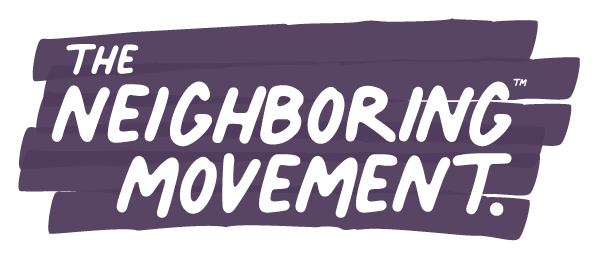Neighboring and Peacebuilding
“This will be our reply to violence: to make music more intensely, more beautifully, more devotedly, than ever before.” ~ Leonard Bernstein
When crazy things are happening in the world, we at The Neighboring Movement find it helpful to sit back, reflect upon what’s happening, and write about how we’re making sense of it all. We hope these words both shed light on how we’re thinking about these issues and also perhaps provide some encouragement in the midst of the din of it all.
As I (kristopher) reflect upon the atrocities of war happening right now in places like North and East Syria, Ukraine, and Gaza, I often find myself feeling a despair so deep that I quickly attempt to stop thinking all together, just to seek the thoughtless void that means people aren’t currently dying, being forced from the homes they love, etc. And often, that’s relatively easy; I live in Wichita, Kansas, a place that feels so unfathomably far from where all of this is happening, and if I can just push it all from my mind, maybe it isn’t real, maybe it isn’t happening. At the other end of the spectrum, if I can accept the reality of these horrors, my other inclination is to think, “What am I doing? I have to fly to these places, join the nonviolent protests, take part in the resistance!” You see, as a person of extremes, I oscillate between one end of the spectrum and the other - numbing at one, naivete at the other. Hopefully others can relate, or maybe it’s just me?
Because my deepest passion is nonviolence, I got my undergrad in Peace and Conflict Studies. No doubt because I had been working at The Neighboring Movement and so steeped in an asset-based worldview for so long, the part of my education that always struck me the most was just how relevant the asset-based lens is for the realm of peacebuilding. For me, they were so intertwined that I started jokingly referring to abcd’s (asset-based community development) sister as abct (asset-based conflict transformation). In short, abcd attests to the fact that the people within communities are the ones who best know how to develop them. And, similarly, abct attests to the fact that the people within conflicts are the ones who best know how to transform them. All of my education around peacebuilding attested to this fact, and I was so amazed. Maybe the world is just asset-based? It’s everywhere!
So, in this moment, when I am attempting to resist apathy and tempted by a savior complex, I remind myself of this wisdom. How helpful would a pacifist twig child from Kansas really be in place like Gaza? Ukraine? North and East Syria? I don’t know, but I see my role as three-fold:
Educating myself upon these conflicts, so I can more deeply understand the reality in which I live and have informed conversations with people around me about them.
In any way I can, supporting those bold and beautiful peacebuilders who actually live in the places experiencing these incredibly complex conflicts and are on the ground, transforming them there.
And, most important, being a peacebuilder exactly where I am - my block, my neighborhood, Wichita, Kansas, United States of America. What better to do in the midst of confounding global conflict than to attempt transforming conflict wherever I am? Who better to transform conflict here, in my context, than me? Who better to take part in the global transformation of conflict through the medium of my own context than me?
As much as we at The Neighboring Movement joke about neighboring always being our answer, it really is my answer in this moment. How else can I make sense of what’s happening around me other than through what’s happening right around me? In a time so characterized by division, how better to act than to connect with those right around me, regardless of how different they may seem? Because in many ways, neighboring really is conflict transformation in a hyperlocal context. I have the opportunity to utilize my own assets, and the assets all around me, to help transform the unique slice of life in which I find myself.
If, like me, you resonate with any of this, I would encourage you to educate yourself on these complex conflicts, support those working for peace in the midst of them in any way you can, and also to give neighboring and block-level conflict transformation a whirl. I promise: you will not be disappointed, you will feel incredibly energized, and you will become inextricably connected to this beautifully, messy world of people just attempting to be in community with one another. And who’s to say we won’t be preventing future conflicts like these in our own communities? Who’s to say that immediate neighboring won’t influence international neighboring?
Peace to you all, and in times like these, this blessing takes on a whole new meaning…Happy neighboring!

